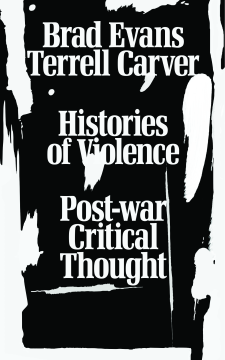
Additional Information
Book Details
Abstract
While there is a tacit appreciation that freedom from violence will lead to more prosperous relations among peoples, violence continues to be deployed for various political and social ends. Yet the problem of violence still defies neat description, subject to many competing interpretations.
Histories of Violence offers an accessible yet compelling examination of the problem of violence as it appears in the corpus of canonical figures – from Hannah Arendt to Frantz Fanon, Michel Foucault to Slavoj Žižek – who continue to influence and inform contemporary political, philosophical, sociological, cultural, and anthropological study.
Written by a team of internationally renowned experts, this is an essential interrogation of post-war critical thought as it relates to violence.
Brad Evans is a reader in political violence at the School of Sociology, Politics and International Studies at the University of Bristol, UK. He is also the founder and director of the multi-media and interdisciplinary Histories of Violence project (www.historiesofviolence.com). His latest books include Deleuze and Fascism (with Julian Reid, 2013), Liberal Terror (2013), Resilient Life: The Art of Living Dangerously (with Julian Reid, 2014) and Disposable Futures: The Seducation of Violence in the Age of the Spectacle (with Henry Giroux, 2015). More at www.brad-evans.co.uk.
Terrell Carver is professor of political theory in the School of Sociology, Politics and International Studies at the University of Bristol, UK. He has published widely on Marx, Engels and Marxism and on sex, gender and sexuality. His most recent books include a two-volume study of Marx and Engels’ ‘German ideology’ manuscripts (with Daniel Blank, 2014) and the Cambridge Companion to The Communist Manifesto (edited with James Farr, 2015). He is co-editor of the journal Contemporary Political Theory and co general editor of three book series: Globalization (with Manfred B. Steger), Routledge Innovators in Political Theory (with Samuel A. Chambers) and Marx, Engels and Marxisms (with Marcello Musto).
‘From Benjamin to Fanon, Arendt to Enloe, these introductions, penned by some of the most important political thinkers writing today, shed light on the urgent need for a sustained reflection on the why and how of violence. This volume will inspire instructors and students and will make a necessary addition to any classroom curriculum.’
Davide Panagia, University of California, Los Angeles
‘Brings together insights from across the canon of contemporary theory in an accessible but thought provoking manner, and with a stellar cast of contributors. This is a remarkable collection that will no doubt become essential reading for everyone interested in the nature of violence.’
Simon Tormey, University of Sydney
Table of Contents
| Section Title | Page | Action | Price |
|---|---|---|---|
| Front cover | Front cover | ||
| About the editors | iii | ||
| Title page | v | ||
| Copyright | vi | ||
| Contents | vii | ||
| About the contributors | ix | ||
| 1. The Subject of Violence | 1 | ||
| Further reading | 12 | ||
| Anthology | 12 | ||
| Books | 12 | ||
| 2. Walter Benjamin | 14 | ||
| Biographical details | 14 | ||
| Confronting violence in the world | 29 | ||
| Further reading | 30 | ||
| 3. Hannah Arendt | 31 | ||
| Biographical details | 31 | ||
| Theorising violence | 33 | ||
| Confronting violence in the world | 44 | ||
| Further reading | 47 | ||
| 4. Frantz Fanon | 48 | ||
| Biographical details | 48 | ||
| Theorising violence | 49 | ||
| Confronting violence in the world | 67 | ||
| Further reading | 69 | ||
| 5. Michel Foucault | 70 | ||
| Biographical details | 70 | ||
| Theorising violence | 73 | ||
| Confronting violence in the world | 86 | ||
| Further reading | 88 | ||
| 6. Jacques Derrida | 89 | ||
| Biographical details | 89 | ||
| Theorising violence | 90 | ||
| Confronting violence in the world | 103 | ||
| Further reading | 106 | ||
| 7. Gilles Deleuze | 107 | ||
| Biographical details | 107 | ||
| Theorising violence | 112 | ||
| Further reading | 123 | ||
| 8. Judith Butler | 124 | ||
| Biographical details | 124 | ||
| Theorising violence | 127 | ||
| Confronting violence in the world | 136 | ||
| Further reading | 141 | ||
| 9. Zygmunt Bauman | 142 | ||
| Biographical details | 142 | ||
| Theorising violence | 144 | ||
| Confronting violence in the world | 155 | ||
| Further reading | 156 | ||
| 10. Paul Virilio | 157 | ||
| Biographical details | 157 | ||
| Theorising violence | 161 | ||
| Confronting violence in the world | 174 | ||
| Further reading | 176 | ||
| 11. Giorgio Agamben | 177 | ||
| Biographical details | 177 | ||
| Theorising violence | 178 | ||
| Confronting violence in the world | 191 | ||
| Further reading | 192 | ||
| 12. Slavoj Žižek | 193 | ||
| Biographical details | 193 | ||
| Theorising violence | 195 | ||
| Confronting violence in the world | 212 | ||
| Further reading | 214 | ||
| 13. Cynthia Enloe | 215 | ||
| Biographical details | 215 | ||
| Theorising violence | 216 | ||
| Confronting violence in the world | 231 | ||
| Further reading | 231 | ||
| Index | 232 | ||
| Back cover | Back cover |
